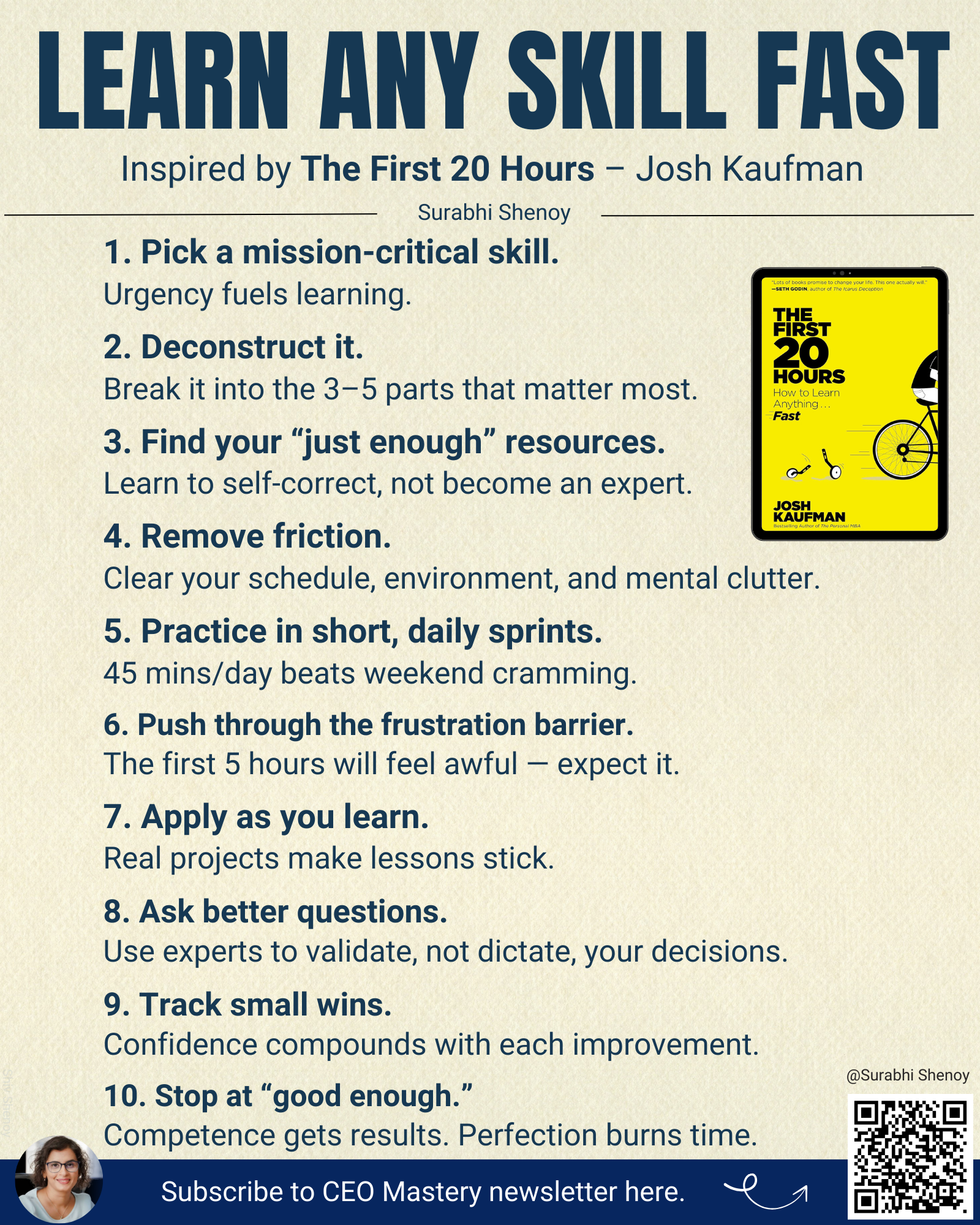Founders don’t lack ambition.
They lack bandwidth.
Between investor updates, customer calls, and product decisions, there’s barely time to breathe, let alone learn a new skill.
But what if you could make real progress in just 20 hours? That’s the core of rapid learning for founders — not mastering everything, but learning just enough to move fast and make smarter decisions.
Josh Kaufman’s The First 20 Hours breaks a common myth:
That learning something new requires 10,000 hours of grinding.
It doesn’t.
For founders especially, this shift is powerful — because what you don’t know is often the next bottleneck. And what you could learn quickly might be your next advantage.
Here’s what this book can teach you.
The Myth of 10,000 Hours
Most people still think mastery = 10,000 hours.
Kaufman’s core argument? That’s not only wrong — it’s discouraging.
10,000 hours is for elite, world-class performance.
But most of us aren’t trying to win the Olympics.
We’re trying to get dangerously good at something fast, so we can use it, apply it, and move forward.
You don’t need to master code, pitch decks, or storytelling.
You just need to get good enough to make meaningful progress.
Skill Stacking > Deep Specialization
One of the most founder-relevant insights in the book is this:
You don’t need to become an expert. You need to become functional.
Kaufman shows how quickly you can stack foundational skills — enough to ship a prototype, record a video, or write solid copy.
This approach turns learning into leverage.
Want to test ideas faster? Learn basic design.
Want to communicate vision better? Learn presentation skills.
Want to automate more? Learn no-code tools.
You don’t need to be world-class. You just need to be capable. Founders who can learn new skills fast, without perfectionism, gain a serious edge. Speed, not polish, wins early-stage execution.
The 4-Step Method to Learn Anything Fast
Kaufman offers a system. It’s simple — and it works.
- Deconstruct the skill.
Break it into parts. Don’t try to learn everything. Learn just what matters first. - Learn enough to self-correct.
Skip the theory. Get just enough context to practice without going in circles. - Remove barriers to practice.
Turn off distractions. Set up your space. Block time like you would a critical meeting. - Practice at least 20 hours.
Not all at once. Spread it out. But commit. Most people give up after 2 hours — long before real progress.
For founders, this framework is gold.
You don’t need another course. You need a time-boxed plan, clear focus, and momentum.
Want the whole system on one page?
Here’s a quick cheat sheet that breaks down the key principles from The First 20 Hours — tailored for busy founders who need to learn fast and execute even faster.

Founders Who Learn Fast, Win Fast
Founding is a high-variance game.
The faster you can acquire relevant skills, the faster you reduce risk.
Founders who can write, pitch, sell, and prototype — even just decently — get to market faster.
They iterate more quickly.
They depend less on hiring specialists for everything.
And that independence?
It compounds.
So if you’re hesitating to pick up a skill because you think it’ll take too long — this book will completely change your mind.
Better Skills. Less Time. More Leverage.
The First 20 Hours doesn’t promise mastery.
It offers something better: rapid, deliberate progress.
For founders who can’t afford to waste time, or wait for perfection, this book gives you the tools to start, stick with it, and level up faster than you thought possible.
If you’re curating books for startup founders that offer practical, time-efficient frameworks — start with this one.
Subscribe to Surabhi Shenoy’s newsletter for weekly clarity drops for tech founders.
— Surabhi Shenoy

